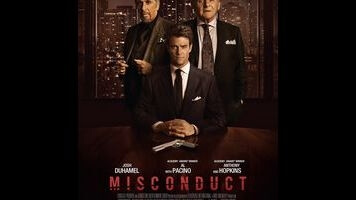Per its title, Misconduct totally wastes Al Pacino and Anthony Hopkins

Twenty years ago, if Al Pacino and Anthony Hopkins had signed on to co-star in a legal thriller, it would’ve been one of the major events of the movie year: a likely box-office hit, and maybe even an awards contender. In the decades since, Pacino and Hopkins have lost a lot of clout. Some of that’s just part of the natural cycle of stardom, where older actors give way to the young. Some of it has to do with the career choices the two men have made since their Oscar-winning heydays, as they’ve taken so many nondescript gigs, they’ve tarnished their brand. But there may be something else afoot. In the American movie business in the 2010s, the old star system has been co-opted by financial planners.
Just look at the cast surrounding Pacino and Hopkins in Misconduct. The real lead is TV actor Josh Duhamel, playing Ben, an ambitious, amoral lawyer working for Pacino’s character, a high-powered attorney named Abrams. One night Ben runs into—and subsequently has sex with—an old girlfriend, Emily (Malin Akerman), who may have inside information that he can use in a big case against Denning (Hopkins), a corrupt pharmaceutical executive. When Denning gets word that Emily’s been abducted, he calls on a kidnapping expert named Jane (Julia Stiles) to save her, so that he can protect what she knows about the shadier aspects of his business. A lot of the case’s clues point to Ben, who has a hard time explaining to his wife Charlotte (Alice Eve) why he’s been spending so much time with his ex.
Duhamel, Akerman, Stiles, Eve… this may not be a roll call of the greatest actors of the 2000s, but they do all have likable screen presences, and some strong credits on their resumés. None are above doing a straight-to-video-quality genre-piece, any more than Hopkins or Pacino are. It’s the assemblage of all six that’s baffling. Why so many recognizable stars? It’s not like the creative team has an attractive creative pedigree. Co-screenwriters Simon Boyes and Adam Mason have been pumping out grubby B-movies like Broken, Junkie, and Hangman for the better part of a decade, while first-time feature-director Shintaro Shimosawa is a TV writer who long ago was part of the team of producers on the American remake of The Grudge—and hasn’t done much of note since.
The material’s not that great either. Boyes and Mason’s script is as vague as it can be about the pharmaceutical industry and legal profession, limiting its detail to the occasional term like “clinical trials” or “evidence.” Mostly the plot’s just a twist-generating machine, as Ben’s investigations into Denning—and into Emily’s disappearance—reveal that he’s far from the sleaziest individual in this story. Meanwhile, Shimosawa makes a sloppy stab at aping Brian De Palma, focusing so much on dynamic camera moves that in some scenes the actors have to wait a few extra beats before they can deliver their lines. Occasionally, to fill in the narrative gaps created by the emphasis on style over information, the movie shoehorns in some awkwardly overdubbed dialogue, which only serves to make it feel even more remedial.
If Misconduct were more lurid—or more shamelessly idiotic—it might at least be a guilty pleasure. But instead it’s slow-paced, and the filmmakers’ idea of cheap thrills is to make Emily a masochist, who gets turned on by being spanked and slapped around. The younger actors do their best with scenes that are either generic, confusing, or repugnant, with Eve being especially sharp in a role whose function seems to change from minute to minute. But only Pacino and Hopkins show any sense of how far beneath them this movie is, and they perform accordingly, with scenery-chewing flair. Hopkins snarls and sneers exaggeratedly, delivering lines like, “You see what happens when you fuck with me?” with what feels like an internal eye-roll. And Pacino takes Misconduct’s New Orleans setting as an excuse to do his best Foghorn Leghorn impression.
As is often the case with these kinds of projects, the two biggest stars barely appear. Hopkins and Pacino each have about three or four scenes, and only one where they’re “together”—although they don’t really interact much, and could’ve easily shot their parts separately. Not so long ago, the characters Hopkins and Pacino play here would’ve been handled by veteran character actors. These days, it seems like each week there’s another VOD title like Misconduct, with a cast made up of Oscar-winners, former blockbuster action heroes, and talented B- and C-listers. These are “deal memo movies,” where the packaging alone guarantees a certain amount of financial backing, and the stars all get a proportional cut—without having to do a lot of work. And who can blame them? They deserve to get paid. But they’ve all gotten their money by now. There’s no reason for moviegoers to get involved.